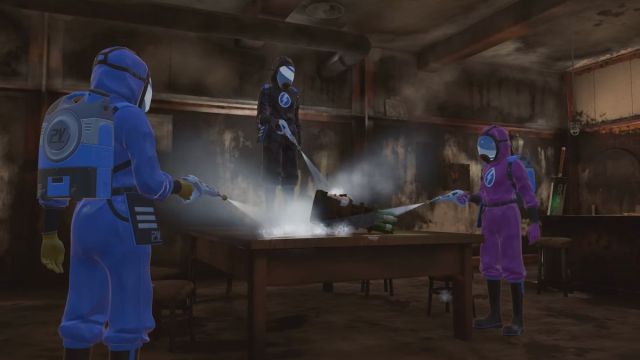One console, two players
Pretty recently, a new expansion for Powerwash Simulator came out. I liked Powerwash Simulator well enough when I played it back in 2021, but this was the first time I was tempted to dip back in for more. That’s because the latest update features locales from Final Fantasy VII, and the game added co-op a little while back. My girlfriend finished the original Final Fantasy VII not too long ago, so I figured this would be a fun way to spend a few hours.
Until I took to Google and discovered that Powerwash Simulator‘s co-op is online only.

Lately, I’ve watched this play out with a number of AAA games. Games like Gotham Knights and Pokémon Scarlet and Violet were total slogs, not just because of their poor technical optimization and bizarre design choices, but because I knew that I could have had more fun if I shelled out an extra $300-600 to play them with my partner. Both of those games heavily touted their co-op offerings in marketing, but neither of them offered anything for folks in the same room. Halo Infinite, a game I loved, would have been that much better if I could’ve roped in a friend without telling them to burn money on a new console or PC.
Where did the couch go?
I’ve always been a local multiplayer kind of person. My earliest exposure to video games was a Wii my parents bought to force family bonding. Super Smash Bros. and Mario Kart are good online, but I’ll usually only break them out when I have people over. I don’t have anything against online gaming (it got me through lockdown, and any friend of mine will tell you how often I pester them about playing Final Fantasy XIV with me), but I love local multiplayer.

I especially adore local co-op. If I’m working with someone else towards a goal, I want to be with that person physically. Having the option for online play is always welcome, but if I can conceivably play the same game as my companion, in the same room and on the same screen, I’ll always take that option. I recognize that games are constantly getting bigger, and it’s getting harder and harder to justify rendering the same things twice at the same time just to satisfy an increasingly small group that cares about this kind of thing.
But for me, there’s simply no energy quite like the energy shared between two (or more) people in one room sharing an experience. It’s the difference between calling a friend and going out for dinner—sure, you’ll find out what they’ve been up to either way, but sometimes you want to be in that space, sharing that experience together.
So as franchises like Halo, which was once known for its split-screen co-op, shy away from the couch-sharing experience, I can’t help but feel a little sad.
Quiet revival
Blessedly, local multiplayer is down but not out. It’s becoming more and more sparse in the AAA space, but indies have kept the dream alive admirably. Spelunky 2 retained the local mayhem found in the 2013 not-quite-original, and the Overcooked series has built its identity around intense, frantic same-screen sessions. It Takes Two recently became the only indie game in the history of the Game Awards to take home the GOTY prize, in large part because of its local co-op offerings.

There are also still a few studios in the AAA space preserving the local multiplayer experience. Nintendo has been ruthlessly committed to keeping local co-op offerings available on the Nintendo Switch, a platform that initially sold itself, at least in part, on its two in-built controllers. Kirby and the Forgotten Land is an absolutely perfect local experience, and the more recent Kirby’s Return to Dream Land Deluxe bumps the player count from two to four. Outside of Nintendo, Diablo 4 is slated to follow in its immediate predecessor’s footsteps with a couch co-op mode. The most recent crop of Borderlands games offers local play on consoles as well. The scene isn’t thriving, necessarily, but it is surviving.
All of these games also have online offerings, and that’s a great thing. Not everybody lives near the people they want to spelunk with, and I will always advocate for better online options. But all of these games also recognize that there is a good reason for players to want to be near each other physically. Video games can be an isolating hobby, but they also have the capacity, as a medium, to force people together. I wish more games took advantage of that inherent strength of the format, but for now, I’m simply glad that there’s still space for that kind of game somewhere.














Published: Mar 10, 2023 12:00 pm